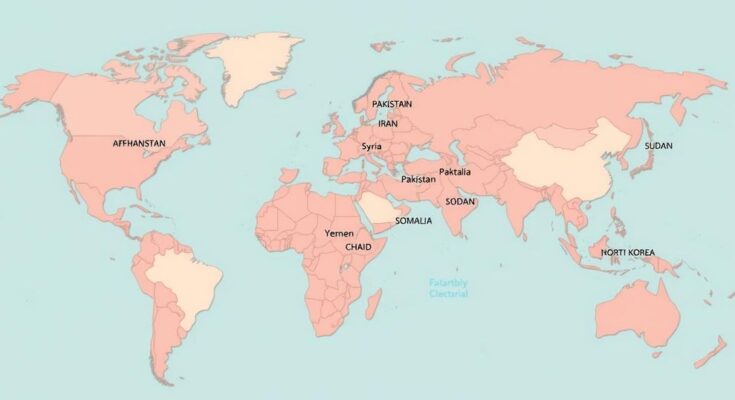The Trump administration is preparing to impose new US entry restrictions affecting several countries due to security concerns. Afghanistan, Pakistan, Iran, Libya, Somalia, Sudan, Syria, Yemen, Chad, North Korea, and Venezuela may face limitations on travel and visas. Advocacy groups raise alarms over the impacts on refugees, while civil rights organizations criticize the necessity of additional restrictions. An official announcement is anticipated shortly.
The Trump administration is preparing to implement new entry restrictions for the United States that may affect various countries, including Afghanistan, Pakistan, Iran, Libya, Somalia, Sudan, Syria, Yemen, Chad, North Korea, and Venezuela. This initiative follows an Executive Order signed on January 20, which mandates federal agencies to evaluate nations with inadequate security screening and vetting measures. The proposed changes could result in partial or full suspensions of admissions from these countries, with an official announcement anticipated soon.
During his previous term, President Trump enacted a series of travel bans that began in 2017, primarily targeting nations perceived as security threats. The initial iteration faced substantial backlash, being labeled a “Muslim Ban” as it primarily affected Muslim-majority countries. Legal challenges ensued; however, the U.S. Supreme Court upheld the third version of the ban in 2018, asserting it was within the President’s jurisdiction to implement national security protocols.
Although the comprehensive list of affected nations remains unconfirmed, both Afghanistan and Pakistan have emerged as candidates for potential restrictions. Advocacy organizations like the International Refugee Admissions Project (IRAP) express concern about the negative implications for Afghan refugees, especially for Special Immigrant Visa (SIV) holders escaping Taliban threat.
Furthermore, Pakistan is reportedly facing scrutiny due to security issues and inadequate vetting processes. If included in the restrictions, it could adversely affect countless Pakistani nationals applying for U.S. visas.
Civil rights groups, such as the American Civil Liberties Union (ACLU), have voiced strong opposition to the prospective travel ban, arguing that it would exacerbate existing challenges. They assert that the State Department and the Department of Homeland Security (DHS) currently implement some of the most rigorous vetting procedures globally, rendering further restrictions excessive.
In accordance with the Executive Order, both the State Department and DHS are tasked with concluding their review and finalizing the list of countries within 60 days. As the deadline approaches, an official statement regarding the specific restrictions is impending.
In summary, the Trump administration is considering new travel restrictions affecting various countries due to security screening concerns. The move follows a history of travel bans linked to national security perceived threats. Advocacy groups express concern over the potential impact on refugees, particularly Afghan individuals. Civil rights organizations have strongly opposed the measure, citing the adequacy of current vetting processes. An official announcement is expected soon, as authorities finalize the list of affected nations.
Original Source: www.travelandtourworld.com




